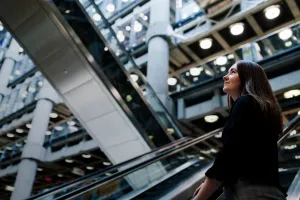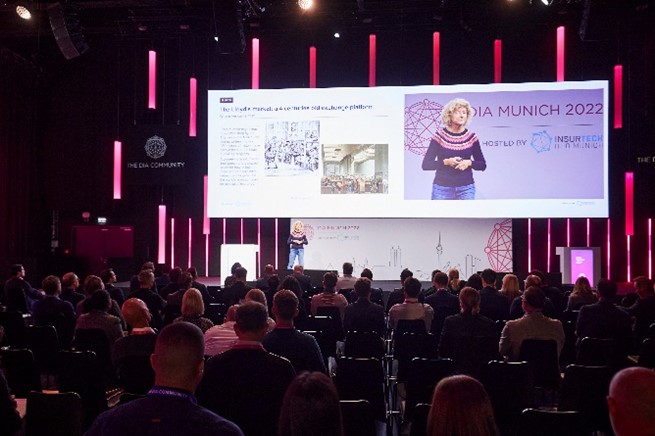On 28 September 2022, Lloyd’s Europe CEO Amelie Breitburd delivered a Keynote at the Digital Insurance Agenda (DIA) Munich conference. This was followed by an interview by the DIA media team on the same day. What follows is an edited transcript summary of the key takeaways from that day.
Amelie Breitburd
Lloyd's Europe CEO
Natural catastrophes, flooding, and heat waves: climate change is everywhere. Think of the recent 2021 floods in Germany, the Netherlands, and Belgium: they have an increasing impact on our lives. Yet only a quarter of the European population is insured against these events. Why is that?
Amélie, could you give us a bit of history on Lloyd’s?

Edward Lloyd’s Coffee Shop was actually the first marketplace for insurance products in Europe. Lloyd’s created the first burglary, motor, D&O, satellite, political risks and cyber policies, to name but a few. Today, all kinds of exchanges are being made in Lloyd’s iconic building. When you go there, as a customer, you’re going to get 5 to 10 quotes and those are going to be really fair prices because there’s strong competition on the floor. The place has changed a little bit, it’s more diverse. I’m a woman, while back in the day there used to be a lot of men. Lloyd’s is a very innovative place and we’re always aiming for progress. We try to share risks to create a braver and more innovative world.
What do you see as the most important risks we are facing?
Lots of companies are aware of cyber risk. It happens to more people and companies at the same time. For cyber risk, there’s a lot of insurance out there at the moment. Lloyd’s has 20% of that market, but not a lot of people are covered.
Then if we move to climate change, it is everywhere. If we think about Europe alone and think about the 2021 floods in the Netherlands, Germany and Belgium, we are quite exposed to that risk and the ocean. The ice is melting and the level of the ocean increases. And it’s all about solidarity. People that live in certain countries or regions are more exposed than others. But, climate change is everywhere, and that’s also another area where probably people are not protected enough.
Then COVID. That was our generation’s first experience of a worldwide pandemic. A pandemic is happening to lots of people at the same time. And it’s a real challenge from an insurance standpoint because we like independent risks. Luckily, we found a vaccine, but even if you have a vaccine, it’s complex. Some of the first ones needed to be stored at very low temperatures, and you also need to think about transportation.
Also, think about agriculture. Last summer, drought was everywhere, and now there is lots of rain. It’s hard to cope with that. How do we cover those crops? A lot of technology can be developed around those kinds of new risks.
There is also geopolitics. There is a conflict at our doorstep. There is the risk of war and plenty of other risks related to geopolitics. As you may have heard, Lloyd’s is involved in protecting some of the ships transporting grains out of Ukraine under the UN Black Sea Grain Initiative. So this is another way to show that you need to innovate every day, covering the new risks that are emerging.
“Lloyd’s is a very an innovative place and we’re always aiming for progress. We try to share risks to create a braver and more innovative world.”Amelie Breitburd, Lloyd's Europe CEO

How do you deal with all these risks?
Each of these risks needs to be considered for what they are individually, but also cumulatively. So insurers are not only covering and looking at risks independently, but they should also look at the accumulation of all those risks together. This is where we start to have a problem because there are more risks and these are more systemic, more interconnected, and also less random. And as you know, the essence of insurance is independency and randomness.
That’s the only way we can ask people to pay a little piece of premium to cover a major catastrophe. But if they all happen at the same time, then this is what we call systemic risk and we start to have an issue. Having said that, even in those cases, even when we start to face systemic risks, we can still use insurance, as long as enough people have insurance.
Coverage is absolutely essential for the survival of this planet so that we can share risk. And this is where we move from what we call mutualization to solidarity – and here the role of innovation is absolutely key.
How do innovation and partnering play into this?
Right from the start, even in the 17th century, we’ve been trying to innovate and partner with others. One thing that’s so special about Lloyd’s is that it’s a marketplace. And as I’ve mentioned, there used to be ship owners, brokers, and customers. I didn’t mention wealthy British lords who were covering those risks. Nowadays, these would be comparable to the more traditional companies like Munich Re, AXA, SCOR, and lots of different companies from everywhere in the world. We have capital coming from pension funds, private equity, etc. This shows that we need all human beings on the planet to cover those risks and address the protection gap, either by bringing more money to this kind of marketplace or by purchasing cover.
Coverage is absolutely essential for the survival of this planet so that we can share risk. And this is where we move from what we call mutualization to solidarity – and here the role of innovation is absolutely key.
How do you see future opportunities to innovate at Lloyd’s?
As a marketplace, Lloyd’s is welcoming innovation. There are a lot of different stakeholders on the market and we’ve always partnered with other people outside of the marketplace to bring them in and be part of this innovation. So what do we do at Lloyd’s?
We have the Lloyd’s Lab: a place where we welcome insurtechs and startups. We have launched ten cohorts already. We welcome them for a few weeks in London at the Lloyd’s Lab. This is where they are mentored by Lloyd’s’ market experts and senior leadership, and start to learn more about what we do, our specific risks, and those so-called distressed risks that we are covering, and then they learn more about pricing. This mentorship happens in all types of dimensions. We can also offer them more access to distribution and we’re organizing events. This is an opportunity for them to grow their network.
We are now focusing on Europe, to focus more on those risks that I’ve mentioned. Some of the risks can be more specific to some of the regions that we are covering here in Europe, and on any type of product. We’d love to welcome insurtechs on one of those future cohorts and solve some of our European-based issues.


